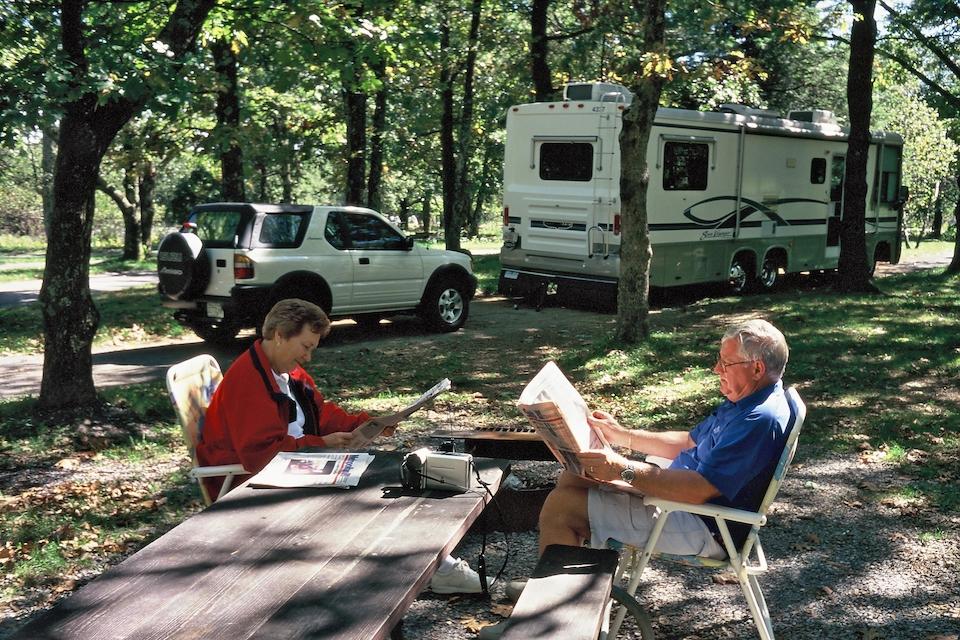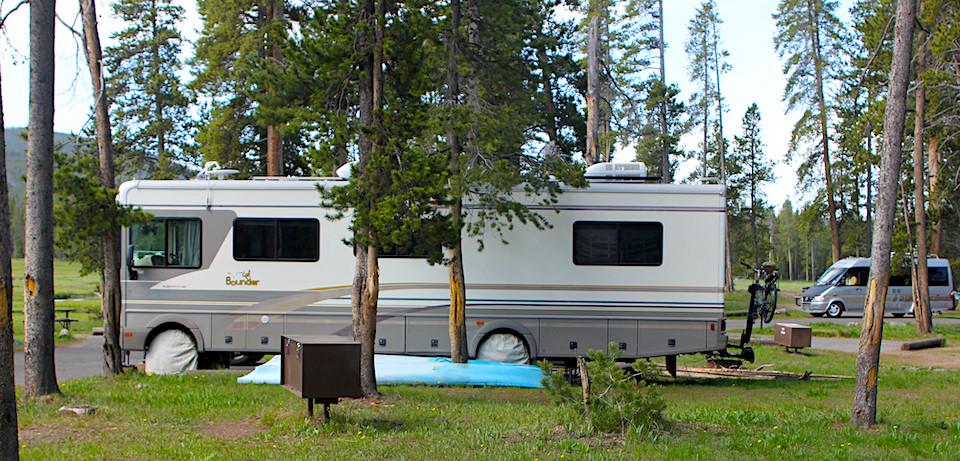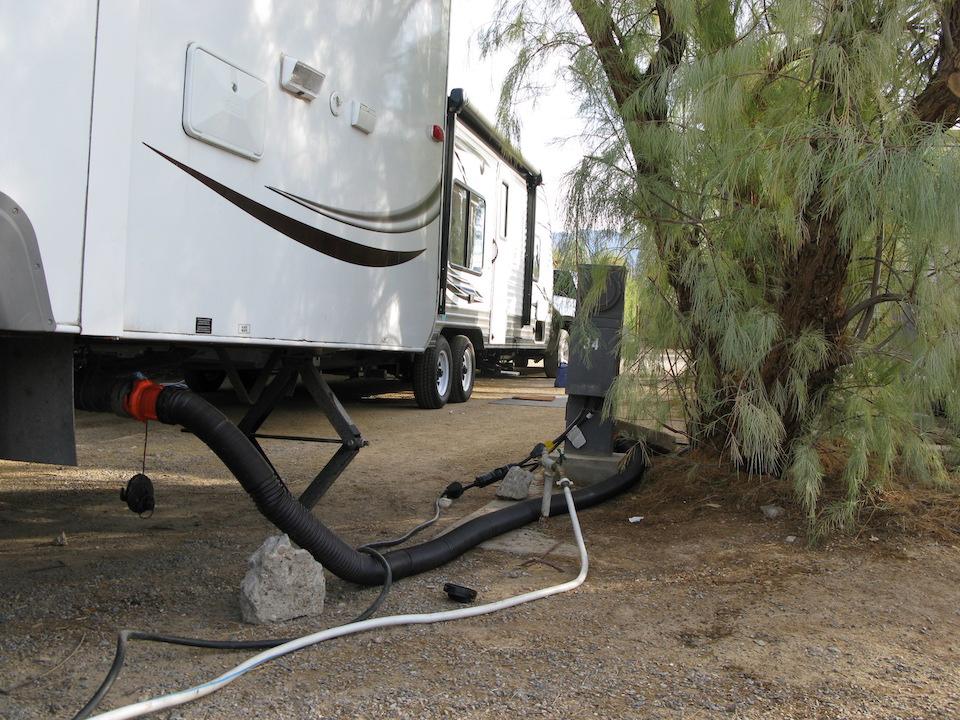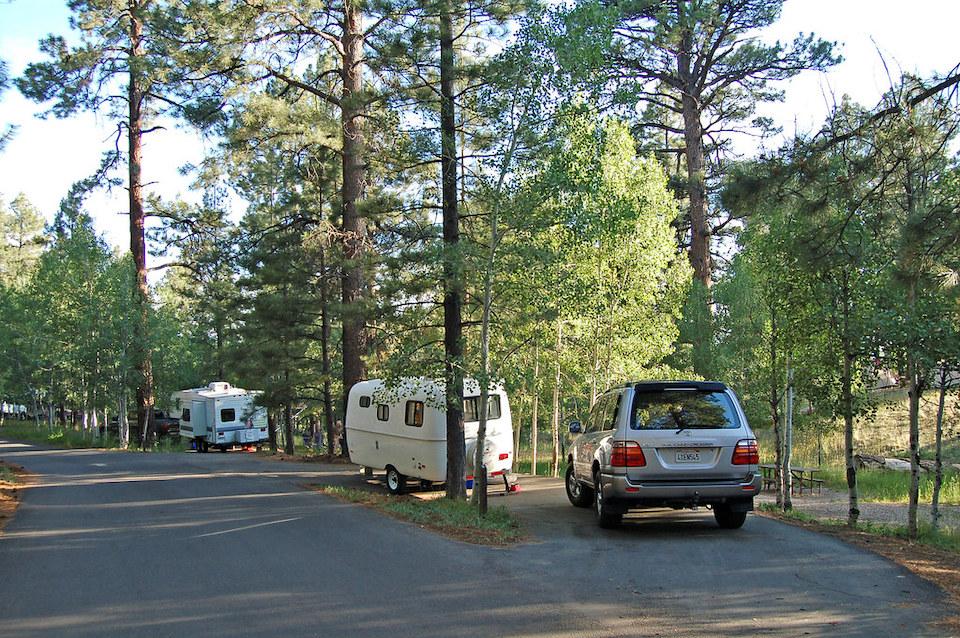
National park campgrounds, such as this one at Big Meadows in Shenandoah National Park, are the best basecamps for RV exploration of the parks/NPS
During our 20s and early 30s, we carried a pack into the woods. But after one taste of the RV life, we were hooked. Sleeping on the ground became a thing of the past once my husband and I discovered the joys of camping in spectacular settings with the option to enjoy water, electric, and sewer utilities. If you’ve ever considered doing the same, here’s what you need to know about plugging into America’s national parks with RV hookup campsites.
When Camping with RV Hookups Make Sense
We traded our backpacks for a fifth-wheel trailer in 2008, but rarely visited RV parks with hookups. “That’s not real camping!” we joked as we opted for rustic dry camping in public campgrounds. Twelve years later, we are more open to occasionally enjoying those full-hookup creature comforts. Maybe we’ve gone soft, but now we understand that connecting to RV hookups in national parks makes total sense sometimes. For example:
Why Have Full Hookups in National Parks?
- In hot weather, you can run the air conditioner. This greatly reduces the heatstroke risk for pets, infants, and the elderly.
- When cold weather strikes, you can set and forget the heater thermostat. A comfortable indoor temperature allows RVers like us to visit national parks during the off-season and reduce park overcrowding.
- Electric medical devices like C-PAP machines need a reliable power source. Electrical hookups allow medically-compromised campers to enjoy America's treasures, without emitting noisy generator power.
As a bonus, sewer connections can reduce RVers’ carbon footprints because we can stay put in one place for longer periods of time. And finally, RV hookups eliminate noisy generator exhaust from the campground.

"Dry" campgrounds in the national parks are easier to land sites at than full-hookup sites/Norris Campground, Yellowstone National Park, NPS/Diane Renkin
Where to Find National Parks with RV Hookup Campsites
Privately-owned, full-hookup RV parks and campgrounds are easily found outside national parks. So why should RVers look for spots inside the park? Because it’s the best way to enjoy an immersive national park camping experience. You’ll drive less and spend more time enjoying the natural features that drew you there in the first place.
The National Park System has 130 destinations with overnight camping. Getting a dry campsite (no hookups) in one of them is relatively easy. Unfortunately, only 13 parks have full or partial utility connections for RVs. If you’re lucky enough to reserve one of these luxury campsites, you will probably discover a more genuine, back-to-nature experience than the privately-owned RV parks located beyond park gates.
To find these campsite gems, take a look at the “Where Can I Camp” directory of camping locations in the National Park Service. You will see just five national park sites with full-hookup RV camping. Seven more provide water or electric or water and electric hookups. It all adds up to stiff competition for utilities in the following locations:

Full hookup campgrounds, such as Furnace Creek in Death Valley National Park, allow you to be self-contained and comfortable/Rene Agredano
U.S. National Parks with Full Hookups for RVs (water, sewer and electric)
Arizona | Grand Canyon National Park: Trailer Village
- 29 full-hookup sites for RV’s up to 28 feet long.
- 50 full-hookup sites for RVs up to 50 feet long.
California | Death Valley National Park
- Furnace Creek: 18 full-hookup sites. Max RV size: 36’
- Stovepipe Wells: 14 full-hookup sites: Maximum RV size: 60’
- Panamint Springs: 6 full-hookup sites: Maximum RV size: 60’
Texas | Big Bend National Park: Rio Grande Village RV Park
- 20 full-hookup sites for reservations only
- 5 full-hookup sites for walk-ups
- Max RV Size: 40-50' depending on occupancy load.
Wyoming | Yellowstone National Park: Fishing Bridge RV Park
- 346 full-hookup campsites for hard-sided RVs only. Max RV Size: 40'
Wyoming | Grand Teton National Park: Colter Bay RV Park
- 142 full-hookup sites. Max RV Size: unlimited for pull-through, 30' for back-in spots.

North Rim Campground at Grand Canyon National Park lacks full hookups, but has a dump station/NPS
U.S. National Parks with Basic Hookups for RVs (water, electric, or both)
Colorado | Black Canyon of the Gunnison National Park: South Rim Campground (electric only)
- 23 electric hookup campsites. Max RV Size: 40’
Florida/Mississippi | Gulf Islands National Seashore:
- Davis Bayou Campground (MS): 52 electric hookup campsites. Max RV Size: 40’
- Fort Pickens Campground (FL): 137 electric hookup campsites. Max RV Size: 40’
South Dakota | Badlands National Park: Cedar Pass (electric only)
- 20 electric hookup campsites. Max RV Size: 70’
Tennessee/Kentucky | Big South Fork National River and Recreation Area
- Blue Heron Campground (KY): 45 electric hookup campsites. Max RV Size: 45’
- Bandy Creek Campground (TN): 96 electric hookup campsites. Max RV Size: 51’
Florida Everglades | Flamingo Campground (electric only)
- 41 electric hookup campsites. Max RV Size: 44’
Things to Know About National Park RV Campsites with Hookups
Advance reservations are a must.
The secret is out: National park RV campsites with hookups are a good deal when compared to nearby rivately owned RV campgrounds. A 2018 National Park Campground Usage Study revealed that many national park campgrounds are near or at capacity for most of the year. Each year thousands of RVers like you and I compete for these precious few sites, so don’t plan on freewheeling without a reservation. When wanderlust strikes, give yourself at least a six-month window ahead of your desired arrival date at the park. Create a flexible plan with alternate camping dates and remember to take advantage of slower times by visiting on a weekday.

Devils Garden Campground at Arches National Park can be particularly challenging to land a spot in if you don't start far in advance/Kurt Repanshek file
The reservations process differs from park to park.
The method to reserve national park campsites is inconsistent across sites. Some vendors only reserve campsites by telephone, but most allow you to do the entire transaction online. Only a few national parks settings, like Furnace Creek at Death Valley National Park, are booked through Recreation.gov, the Internet clearinghouse for public lands recreation reservations. Otherwise, the website for your intended park destination will direct you to the right booking portal. However you reserve a stay, it’s up to you to learn the campground rules for making, changing and canceling reservations.
Know your measurements.
If your RV is on the small side, you’re in luck. Most national park campgrounds cannot accommodate larger, modern RVs over 40 feet long. Therefore, when reviewing RV campsite possibilities, pay close attention to the maximum RV size allowed. This number factors in total RV length, including a tow or towed vehicle.
You also want to consider the width and length of the parking apron. All wheels must be on the parking spot. If yours don’t fit, you will be asked to move or leave. If you don’t know the total length and size of your RV setup, head to a professional RV weigh scale with experts who can figure it out for you.
Carry the right RV supplies.
Utility hookups in national parks are usually reliable, but it doesn’t hurt to prepare for the worst. The most important RV supplies you can have onboard wherever you roam include:
- An exterior RV water filter hose attachment, to reduce the chance of heavy minerals or other contaminants getting into your water lines.
- Formaldehyde-free RV toilet chemicals, to ensure the integrity of a park’s delicate septic system.
- A surge protector for your RV power supply, to lessen the risk of plugging into outdated utility pedestal connections that can damage your electrical system.
If you’re new to RVing, you might be thinking that all the pre-planning is a lot of work. You’re correct, it is. But take it from someone who has camped in national parks from coast-to-coast: scoring a full-hookup RV campsite in beautiful parks like Big Bend or Yellowstone can make you feel as if you won the lottery. And although carrying a backpack into the wilderness, or car camping with a tent requires fewer logistics than the RV life, for campers like me who enjoy a comfortable night’s sleep on a good mattress, the privilege of setting up a temporary home in a world-famous outdoor destination always makes up for the extra steps required to get there.









Comments
How do you really feel?
Our laws are meant for there to be reasonable accomodations, but not unlimited accomodations. There isn't a gondola to the top of Half Dome and there shouldn't be. As far as I know there are still generator hours at most NPS campgrounds to allow recharging of power systems. But how do you suppose this will be paid? Electric hookups cost money to install and provide, and the conditions of our federal campgrounds aren't necessarily in the greatest shape because of inadequate funding.
relax and stop complaining. fault finding is very unkind. people are just looking for the best options.
I'm glad for you that you don't have a disability. maybe don't let your privelige and luck rain on everyone else.
I'm with the majority here, these nasty comments toward RV campers is just unnecessary and frankly hateful! Like others have said, those parks are for every citizen of this great nation, and NOT just tent campers. How rude and arrogant to even suggest that RV campers aren't entitled to the same enjoyment as everyone else! They pay taxes just like everyone else, which goes to support the NPS. Yet somehow, many here, are suggesting they aren't entitled to enjoy the same as tent campers. As others have suggested, there are many reasonable reasons for people to choose and RV over a tent or car camping. Some are medical reasons, some are due to age or simply preference. However, none of those matter, since regardless of what some snobby and arrogant people would like, EVERYONE is entitled to enjoy the NP's that every citizen owns and pays for through their tax dollars and fees! Don't like that, then camp in your backyard, and leave the rest of us to enjoy the beautiful NP's as we see fit.
You left out Mesa Verde Campground in CO. Definitely has water & electric. Awesome campground -- beautiful
Agree with Mike G. No more development in national parks.
The campgrounds already there are sufficient.
You are so right Mr. Thorton. People have forgotten the reason for our National Parks just like they have forgotten why our country was started. Everyone wants everything convenient or handed to them without any effort on their part. Let's get back to BASICS and get back to NATURE.
That's unfair! It isn't necessary to primitive camp to enjoy the benefits of nature in National parks. Some people RV full-time and enjoy being able to experience the entire country. There are also various reasons people want/need electricity while camping (i.e. cpap machines, temperature control for older campers who cannot tolerate extremes, etc) and does NOT mean they are sitting in their campers watching television or not "getting it".